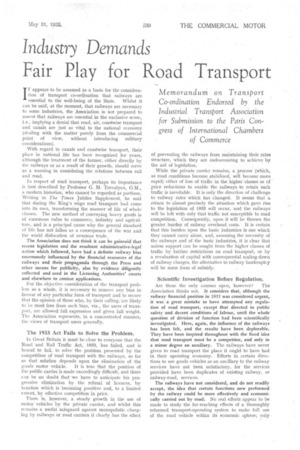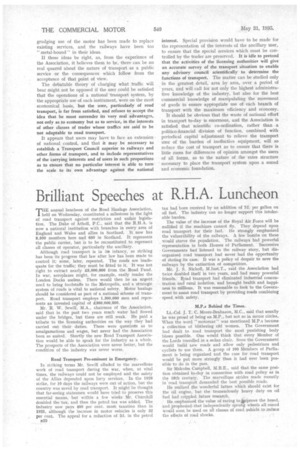Industry Demands Fair Play for Road Transport
Page 47

Page 48

If you've noticed an error in this article please click here to report it so we can fix it.
Memorandum on Transport Co-ordination Endorsed by the Industrial Transport Association for Submission to the Paris Congress of International Chambers of Commerce IT appears to be assumed as a basis for the consideration of transport co-ordination that railways are essential to the well-being of the State. Whilst it can be said, at the moment, that railways are necessary to some industries, the Association is not prepared to assent that railways are essential in the exclusive sense, i.e., implying a denial that road, air, coastwise transport and canals are just as vital to the national economy (dealing with the matter purely from the commercial point of view, without introducing military considerations).
With regard to canals and coastwise transport, their place in national life has been recognized for years, although the treatment of the former, either directly by the railways or as a result of their growth, should serve as a warning in considering the relations between rail and road.
In respect of road transport, perhaps its importance is best described by Professor G. M. Trevalyan, 0,M., a modern historian, who cannot be regarded as partisan. Writing in The .Times Jubilee Supplenient, he said that during the King's reign road transport had come into its own, transforming the manner of life of whole classes. The new method of conveying heavy goods is of enormous value to commerce, industry and agriculture, and is a principal cause why the general standard of life has not fallen as a consequence of the war and the world dislocation of overseas trade.
The Association does not think it can be gainsaid that recent legislation and the resultant administrative-legal action which followed, have had a definite railway bias enormously influenced by the financial resources of the railways and their propaganda through the Press and other means for publicity, also by evidence diligently collected and used in the Licensing Authorities' courts and elsewhere to contest applications.
For the objective consideration of the transport problem as a whole, it is necessary to remove any bias in favour of any particular form of transport and to secure that the opinion of those who, by their calling, are likely to be most free from such bias, viz., the users of transport, are allowed full expression and given full weight. The Association represents, in a concentrated manner, the views of transport users generally.
The 1933 Act Fails to Solve the Problem.
In Great Britain it must be clear to everyone that the Road and Rail Traffic Act, 1933, has failed, and is bound to fail, to solve the problem presented by the competition of road transport with the railways, so far as that solution depends upon the elimination of the goods motor vehicle. It is true that the position of the public carrier is made exceedingly difficult, and there can be no doubt that we have to anticipate his progressive elimination by the refusal of licences, by taxation which is becoming punitive and, to a limited extent, by effective competition in price.
There is, however, a steady growth in the use of motor vehicles by the private carrier, and whilst this remains a useful safeguard against monopolistic charging by railways or road carriers it clearly has the effect
of preventing the railways from maintaining their rates structure, which they are endeavouring to achieve by the aid of legislation.
While the private carrier remains, a process (which, as road conditions become. stabilized, will become more rapid) either of loss of traffic in the higher classes or of price reductions to enable the railways to retain such traffic is inevitable. It is only the direction of challenge to railway rates which has changed. It seems that a, return to almost precisely the situation which gave rise to the legislation of 1933 will occur, and the railway will be left with only that traffic not susceptible to road competition. Consequently, upon it will be thrown the greater burden of railway overhead costs. It is certain that this burden upon the basic industries is one which they cannot carry alone, and, assuming the necessity of the railways and of-the basic industries, it is clear that unless support can be sought from the higher classes of traffic by further restrictions on road transport, or by a revaluation of capital with consequential scaling-down of railway charges, the alternative to railway bankruptcy will be some form of subsidy.
Scientific Investigation Before Regulation.
Are these the only courses open, however? The Association thinks not. It considers that, although the railway financial position in 1933 was considered urgent, it was a great mistake to have attempted any regulation of road transport, except that directed to public safety and decent conditions of labour, until the whole question of division of function had been scientifically investigated. Here, again, the influence of the railways has been felt, and the results have been deplorable. They have been inspired throughout with the fixed idea that road transport must be a competitor, and only in a minor degree an auxiliary. The railways have never given to road transport the place it ought to have had in their operating economy. Efforts in certain directions to use goods vehicles as an ancillary to the railway services have not been satisfactory, for the services provided have been duplicates of existing railway, or railway-road, services.
The railways have not considered, and do not readily accept, the idea that certain functions now performed by the railway could be more effectively and economically carried out by road. No real efforts appear to be made to study the far-reaching effects of a thoroughly reformed transport-operating system to make full use of the road vehicle within its economic sphere; only
grudging use of the motor has been made to replace existing services, and the railways have been too " metal-bound " in their ideas.
If these ideas be right, as, from the experience of the Association, it believes them to be, there can be no real quarrel about the nature of transport as a public service or the consequences which follow from the acceptance of that point of view.
The debatable theory of charging what traffic will bear might not be opposed if the user could be satisfied that the operations of a national transport system, by the appropriate use of each instrument, were on the most economical basis, but the user, particularly of road transport, is far from satisfied, and refuses to accept the idea that he must surrender its very real advantages, not only as to economy but as to service, in the interests of other classes of trader whose traffics are said to be not adaptable to road transport.
It appears that users may have to face an extension of national control, and that it may be necessary to establish a Transport Council superior to railways and other forms of transport, and to include representatives of the carrying interests and of users in such proportions as to ensure that no particular interest is able to turn the scale to its own advantage against the national interest. Special provision would have to be made for the representation of the interests of the ancillary user, to ensure that the special services which must be controlled by the trader are preserved. It is idle to pretend that the activities of the licensing authorities will give an accurate survey of the transport situation to enable any advisory council scientifically to determine the functions of transport. The matter can be studied only in the greatest detail, area by area, over a period of years, and will call for not only the highest administrative knowledge of the industry, but also for the best commercial knowledge of manipulating the movement of goods to ensure appropriate use of each branch of transport with the maximum efficiency and economy.
It should be obvious that the waste of national effort in transport to-day is enormous, and the Association is satisfied that scientific co-ordination, rather than a politico-financial division of function, combined with periodical capital adjustment to relieve the transport user of the burden of ineffective equipment, will so reduce the cost of transport as to ensure that there is little room for differences of opinion amongst the users of all forms, as to the nature of the rates structure necessary to place the transport system upon a sound and economic foundation.




































































































